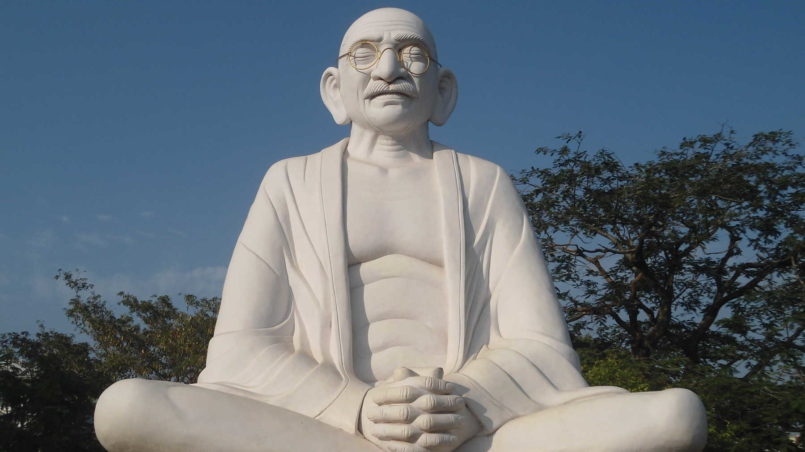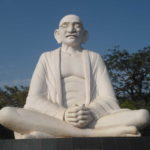Mahatma Gandhi’s Philosophy of Ahimsa

Whenever I think of non-violence, some names immediately spring to my mind. And one amongst those names is Mahatma Gandhi for obvious reasons. As an Indian, I grew up listening and reading about Mahatma Gandhi, who is considered the Father of the Nation (India).
The contribution of Gandhi as a freedom fighter against British colonial rule is enormous as well as incomparable, for he invented a unique way to deal with the colonial rule and achieve independence for the nation.
Gandhi is revered, not only for his contributions as a freedom fighter, but also for conceptualizing and providing a new way to deal with injustice and oppression. He was an exponent of non-violence and provided a unique philosophy, based on truth and non-violence as a guide to lead one’s life.
According to Gandhi, Truth and Ahimsa are organically linked and thus are fundamental in his philosophy of life. Gandhi understood Truth as God, and God as Truth, while Ahimsa is described by Gandhi as uttermost selflessness.
According to many philosophers, God is the highest reality. However, Gandhi says that there is nothing besides Truth. So both Truth and God stand for the highest reality or the ultimate reality. And hence the two can be identified. He said that there is no person on Earth who can deny Truth. God can be denied because the atheist does not believe in God. But even an atheist cannot deny the power of Truth. Hence God is identified with Truth in Gandhi’s understanding. Gandhi went so far as to describing Truth as existence, consciousness and bliss.
According to Gandhi, Ahimsa or non-violence has a positive meaning also. According to Gandhi, non-violence means “love” in a very positive sense. It means love towards all living creatures. The concept of non-violence is extended not only as a means to human love but to love for all sentient creatures of the world. This means one should not love only human beings but every living being in the world.
When a person claims to be non-violent, he is expected not to be angry with someone who has injured him. Such a person will not wish anyone harm but instead will wish everyone’s well-being, even of those who have harmed him. Such a person will not cause his perpetrator any physical harm. Thus non-violence is complete innocence.
Gandhi, however, was aware and believed that non-violence in its absolute form is not realizable in practice. But relative non-violence can be realized in practice. Gandhi, therefore, regarded non-violence to be the law of our species. Since Gandhi recognized that the practice of total non-violence in our life is not possible, he wrote: “Man cannot for a moment live without consciously or unconsciously committing outward violence.” This violence is directed against life.
It does not mean meek submission to the will of the evil-doer, but rather means putting one’s whole soul against the will of the tyrant. The Gandhian concept of non-violence is in short dharma in action, and truth translated. It is important to understand that Gandhi’s idea of non-violence is not a static code of morality ready for adoption.
According to Gandhi, Ahimsa or non-violence is the means, while Truth is the end. They are so strongly intertwined that it is impossible to separate them. According to Gandhi, Ahimsa or non-violence has to be practiced at the mental level. It means barring no ill-will against others. So, Ahimsa or non-violence is non-injury to others, not only in the physical sense but in the mental sense also.
Gandhi is of the opinion that: “Killing or inflicting injury to life can be an act of violence only under certain conditions. These conditions are anger, pride, hatred, selfish consideration, bad intention and similar other consideration.” For Gandhi, the positive aspects of Ahimsa are much more basic than its negative characters. Ahimsa is not merely refraining from causing injures to creatures; it stands for a certain positive attitude towards other living beings that one must cultivate.
According to Gandhi, Ahimsa is nothing but Love and Love is that energy which cleanses your inner life and uplifts you. Such Love perpetuates noble feelings like benevolence, compassion, forgiveness, tolerance, generosity, kindness, sympathy, etc.
Gandhi believed that, without the practice of non-violence, Truth can never be realized. He argued that God pervades all beings and all beings are united by God. Thus, the act of unification with God is made possible through Love or non-violence. So in Gandhi’s philosophy of Ahimsa, non-violence is the cementing bond of the Universe and has its origin in God or Truth.
Credits
| Image | Title | Author | License |
|---|---|---|---|
 |
Mahatma_Gandhi_statue_Gandhinagar_Kakinada_01 | Adityamadhav83 | CC BY-SA 3.0 |
